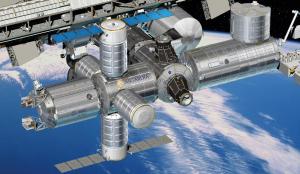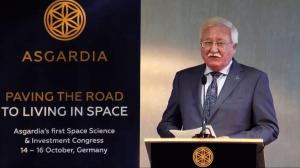Asgardia’s Project For New Module To Expand Space Station
Plans by Asgardia to build and supply a new node module for the International Space Station (ISS) are revealed in the global space industry ROOM Space Journal.
PETERBOROUGH, UNITED KINGDOM, January 8, 2021 /EINPresswire.com/ -- Plans by Asgardia to build and supply a new node module for the International Space Station (ISS) are revealed in an exclusive article in the winter issue of the global space industry publication ROOM Space Journal.Asgardia - represented by three Austrian-based legal entities, Asgardia Terra Ark (ATA) NGO, Asgardia Financial Ark (AFA) AG and Asgardia Independent Research Centre (AIRC) GmbH - has modelled the node on the proven design of existing European-built modules.
Expanding on the project in his ROOM article, Dr Igor Ashurbeyli, founder of Asgardia and the general designer of the Asgardia node module and the lead of the project, said the module would help extend the capacity and commercial value of the Space Station.
Asgardia has created a consortium of established industry players, including Nanoracks Europe, Thales Alenia Space (Italy), OHB System (Germany) and QinetiQ (Belgium), to develop, build and deliver the module.
As well as supporting commercial development and expanding scientific research opportunities, the state-of-art module would ultimately have the capacity to eventually form the core node of an autonomous space station operated by Asgardia.
In his article, Dr Ashurbeyli notes that the limited number of available docking ports and related infrastructure constitutes a major obstacle to the future expansion of commercial capabilities on the ISS.
“To directly address this, Asgardia has proposed the provision of an Asgardia node module that would be integrated into the European part of the ISS,” he says.
Asgardia’s proposal for a new ISS module was submitted in 2020 in response to a European Space Agency (ESA) Call for Ideas entitled, ‘Space Exploration as a Driver for Growth and Competitiveness: Opportunities for the Private Sector’.
Dr Ashurbeyli describes the node module as being “very much in line with the goals of ESA’s space exploration strategy”, adopted in 2014 with the strategic goals of scientific advancement; innovation and economic growth; global cooperation; and inspiration.
“It addresses the current limitations in habitable volume and research capabilities, incorporating the much-needed additional docking ports, which would be made available to both agency and commercial customers.”
He says the project is designed to capture investment from around the world, while providing jobs for European industry and offering a path to take European independence in space to a new level.
Asgardia would own the new infrastructure - comprising a node module based on ISS existing orbital infrastructure developed by the European space industry. It would commercially fund the project via external investment as part of a public-private partnership (PPP) between commercial organisations and ESA.
An initial technical feasibility study would focus on the insertion of the Asgardia node module between Node 2 starboard and ESA’s Columbus, a configuration that best enables the expansion of docking facilities for third party customers.
Development, manufacturing and deployment is planned to take about five years leading to a possible launch in 2026.
The Asgardia node module would also provide functions for autonomous flight, including rendezvous and docking, a capability crucial for the time when, following the ISS end of life, the Asgardia module could be re-deployed as a core element of Asgardia’s proposed Earth Ark, an autonomous space infrastructure that will enable continuous development and research beyond the operational lifetime of the Space Station.
Despite recognising its “technical validity and potential promise”, ESA has for now declined the consortium’s proposal due to what it described as “political and technological risks”, both of which are refuted by Dr Ashurbeyli in his article.
Addressing the widely noted aspect of Asgardia's positioning as a digital space nation, he writes: “As a digital space nation Asgardia is not yet formally recognised by earthly states and so political risks are zero.”
“Technological risks are also minimal given that the consortium members are space industry world leaders and are committed to the project to design, build and delivery. Asgardia also remains confident that the financial resources for the project can be found in the marketplace.”
The ambitious proposal was first revealed to space industry leaders by Dr Ashurbeyli during the Asgardia Space Science & Investment Conference (ASIC) in Darmstadt, Germany, in 2019.
Dr Ashurbeyli, a Russian scientist, businessman and philanthropist, is the Founder of Asgardia the space nation, which is also currently working to launch the world's first national digital economy.
Asgardia's core technical scientific vision is the birth of the first human child in space - a first step towards the ultimate survival of the humankind as a species in the universe. To achieve this Asgardia is examining solutions for protecting people from space radiation, creating artificial gravity for fully-fledged life in space, and is drafting laws to create a fair and equitable society beyond planet Earth.
Clive Simpson
ROOM Space Journal
clive_simpson@room.eu.com


